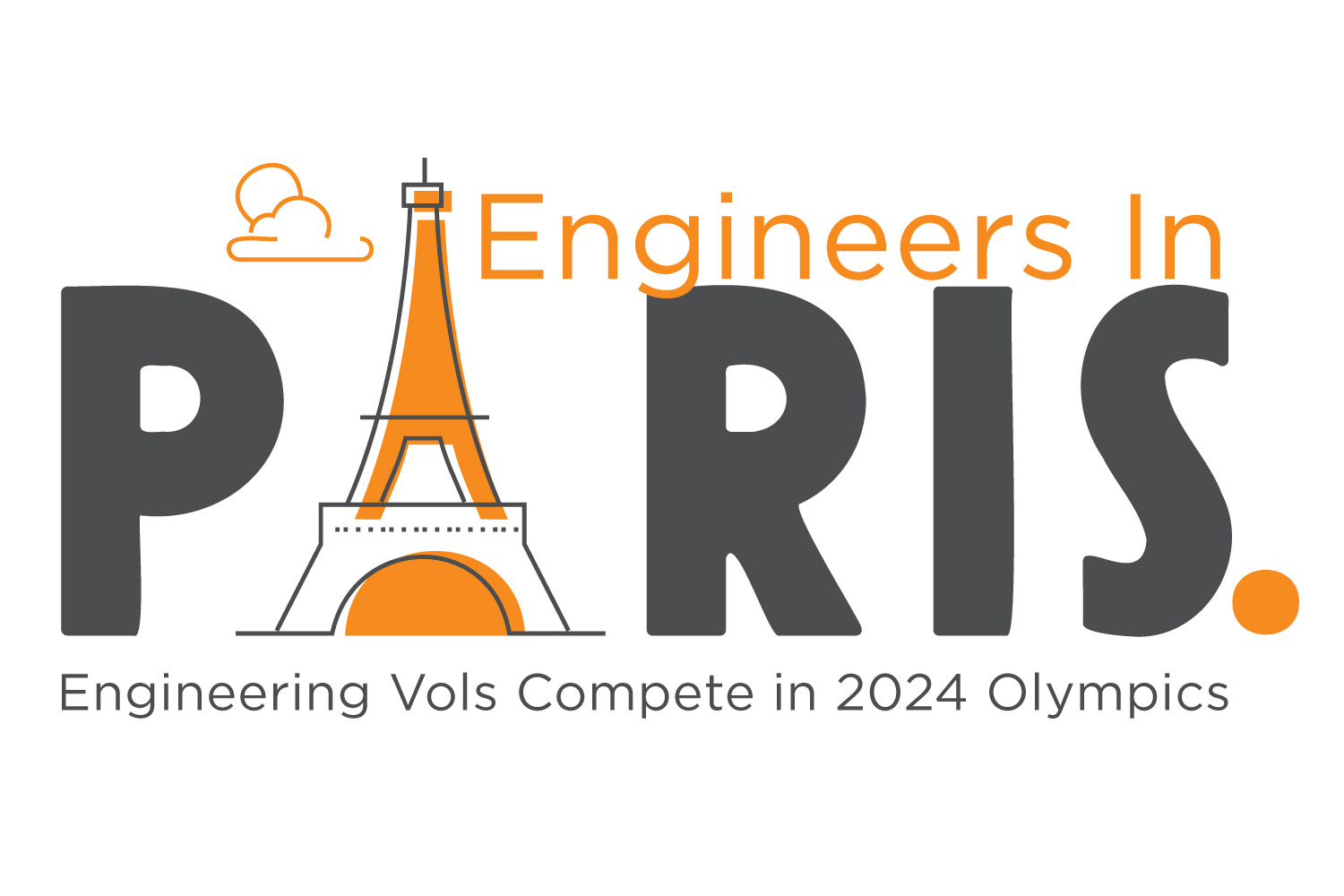
Espernberger Experiences Electricity of Paris Olympics
Any expectation Martin Espernberger had of flying under the radar among his University of Tennessee classmates following a life-changing summer went out the window on the first day of the fall semester.
Espernberger competed in swimming for his home country of Austria in the 2024 Paris Olympics. The junior electrical engineering major finished sixth in the 200 butterfly in a national-record time of 1 minute, 54.17 seconds.
“My professors called me out actually, at the beginning of classes,” Espernberger said. “It was a little embarrassing, but it was very nice of them to do.”
Espernberger has been making people take notice of his abilities in the pool since arriving in Knoxville. The two-time All-American and SEC champion won a bronze medal in the 200 fly at the 2024 World Championships.
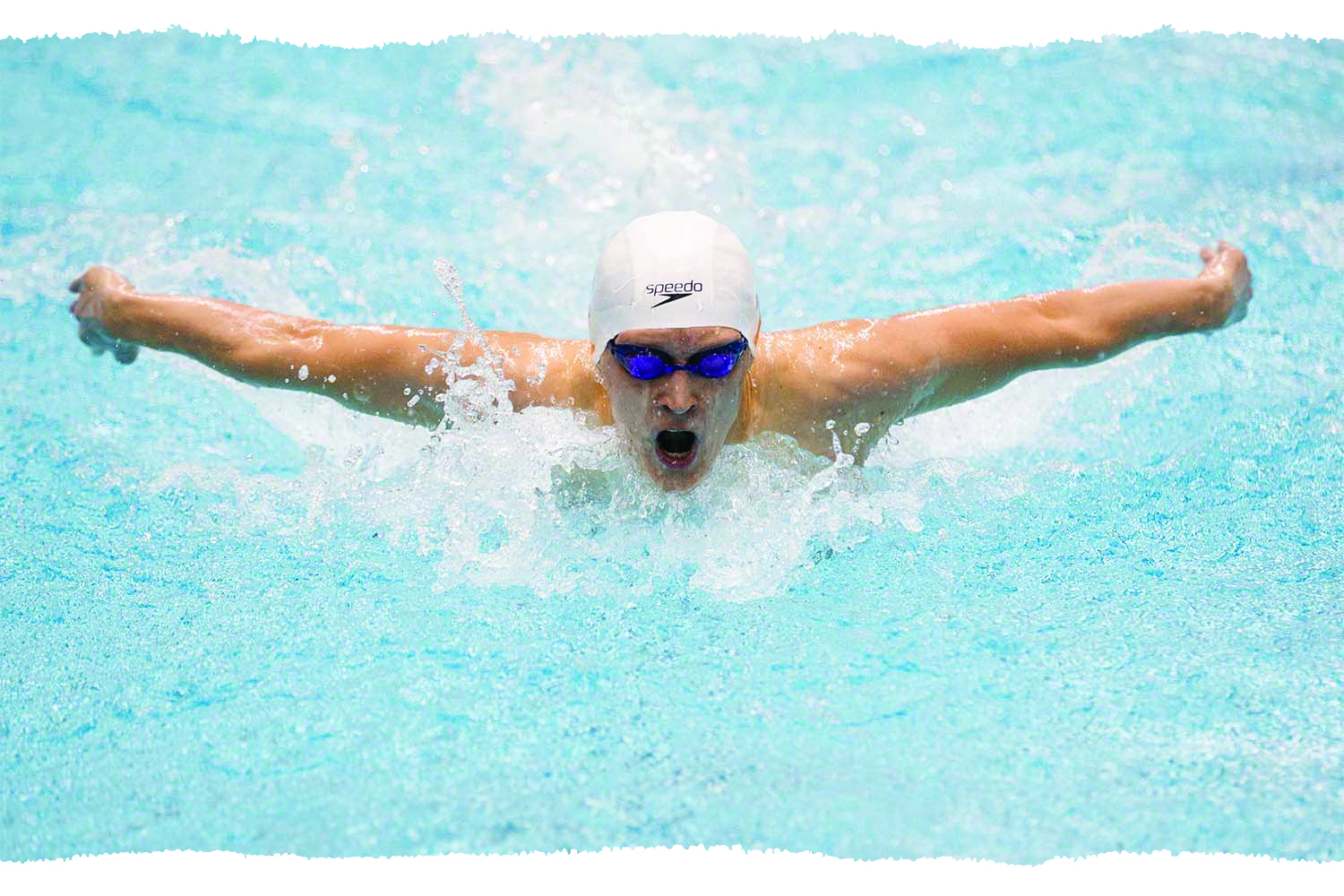
Aside from winning a medal, Espernberger’s Olympic debut was everything he could have imagined. He was able to prove his worth on the biggest global stage while surrounded by the top athletes in sports.
“It was amazing. It’s a feeling you were preparing your whole life for,” he said. “I watched it on TV in 2016 in Rio when I was 15. To have actually been at the Olympics and competed there in the water with everybody else was essentially just a dream come true.”
Espernberger’s athletic success hasn’t come at the expense of his studies. He was named the 2024 SEC Scholar Athlete of the Year for men’s swimming and diving, finishing his sophomore year with a 3.93 GPA.
“I was surprised. I didn’t even know what it was,” he said of the honor. “I got a huge trophy. It’s really, really cool.”
Electric Atmosphere
Espernberger tried to block out all the distractions while competing in Paris. But during the introductions for the 200 fly final, he couldn’t help but marvel at the environment. Espernberger swam in the same event as French superstar Leon Marchand, with the home fans roaring at Marchand’s mere presence.
“The atmosphere left me speechless. The whole stadium went crazy for swimming. That’s a really big deal.”
“Having 17,000 people just watching swimming has never happened before. It was amazing,” he said.
Espernberger was far from alone in Paris. Along with his Austrian teammates, the UT swim program was represented by 17 swimmers and several coaches. They may not have all competed under the same flag, but they all cheered for the Vols and Lady Vols.
“We were like a big swimming team down there,” Espernberger said. “Having that UT support was definitely helpful and improved my performance for sure.”
Excelling in All Areas
Espernberger came to the United States through an exchange program in high school to help improve his English skills. He wound up staying in Florida for 2 1⁄2 years once Covid hit.
“It was great for me swimming wise because Austria is as big as Tennessee. America has different opportunities in sports, with facilities and people,” he said. “There are just more people who are swimming like me and also have similar goals.”
Espernberger knew he wanted to major in electrical engineering while he was being recruited by UT. His father was an electrical engineer before switching to software engineering, and Espernberger has always enjoyed math and physics.
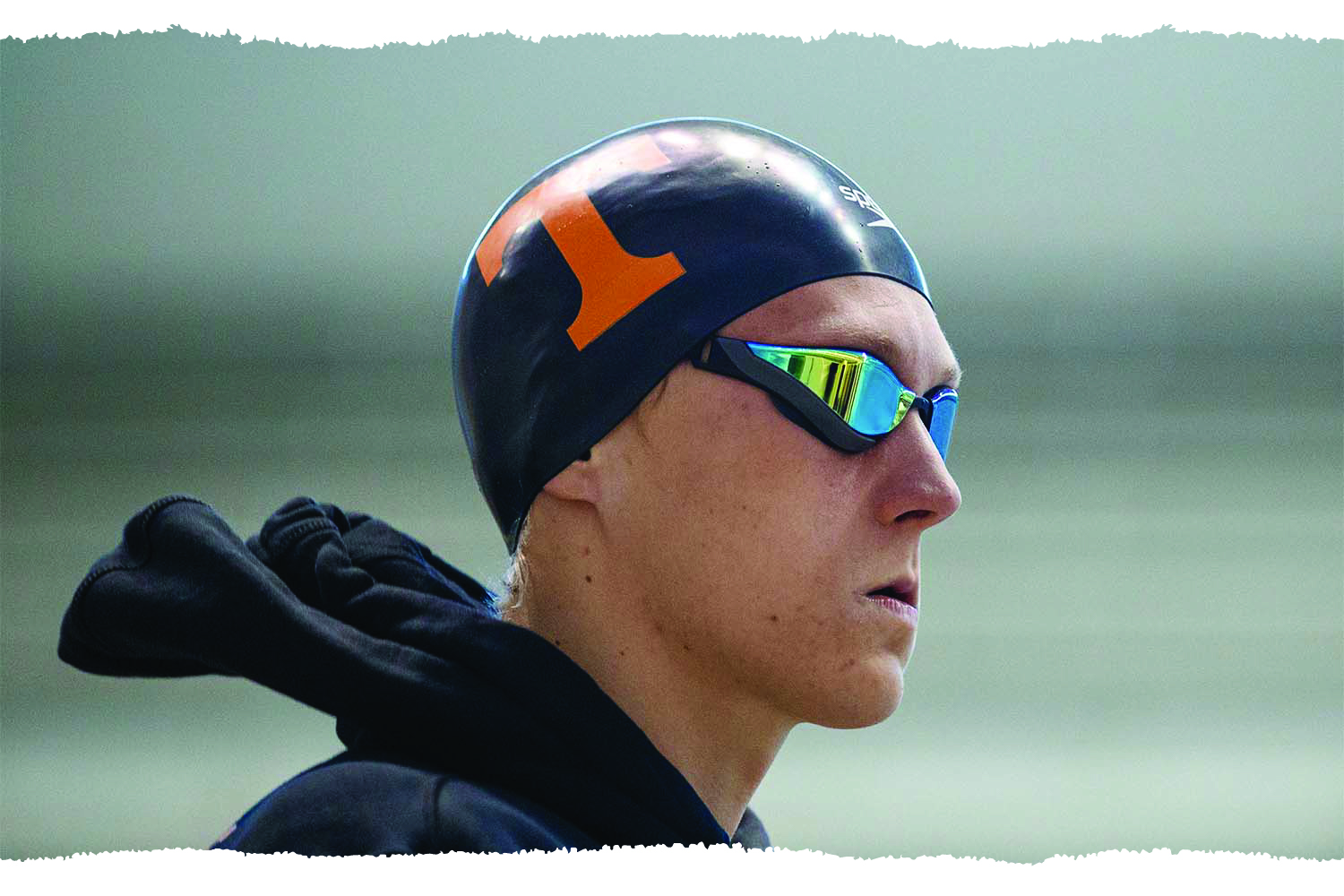
“It’s fascinating. I love the material. It’s just so cool to learn how the world works around you, and all the electricity stuff, like circuits and pretty much anything,” Espernberger said. “As a normal person, you don’t even think about, ‘oh, there’s something in there now which does whatever.’ I really enjoy finding out.”
Espenberger credits his professors, advisors, and coaches for helping him balance his academic and athletic demands. His expectations to achieve remain high in both.
“You can’t just excel in the pool and slack in some other area of life. I want excellence in the pool and excellence in the mind,” Espenberger said. “It definitely requires a lot of time management and a lot of focus on what needs to get done.”
During his Olympic stay, Espernberger was able to watch other sports, tour Paris, and visit the Eiffel Tower. Once he returned to Knoxville, he had the Olympic rings tattooed on his arm to immortalize his debut.
Espernberger is planning to study engineering at UT for five years so he can take classes while training for the 2028 Olympics in Los Angeles.
“I got a personal best in Paris, so it was definitely amazing. I can’t complain about it,” he said. “Winning a medal would have been sweet. But next time.”
Douthwright Achieves Olympic Dream in Paris
Brooklyn Douthwright’s grandfather owned a pool business in Canada, and she grew up swimming in a pool in her backyard. She naturally fell in love with the water and the peace of mind it provided.
Douthwright started in synchronized swimming (now artistic swimming), but soon realized she liked the part where they swam laps during warmups more than the synchronized performance portion. She joined the local race swim team instead and found her true calling.
Douthwright experienced the pinnacle of the sport this summer by competing in the 2024 Paris Olympics. The senior biomedical engineering major was a member of Canada’s 4×100 freestyle relay team that finished fourth overall. Douthwright swam in the prelims for the Canadians.
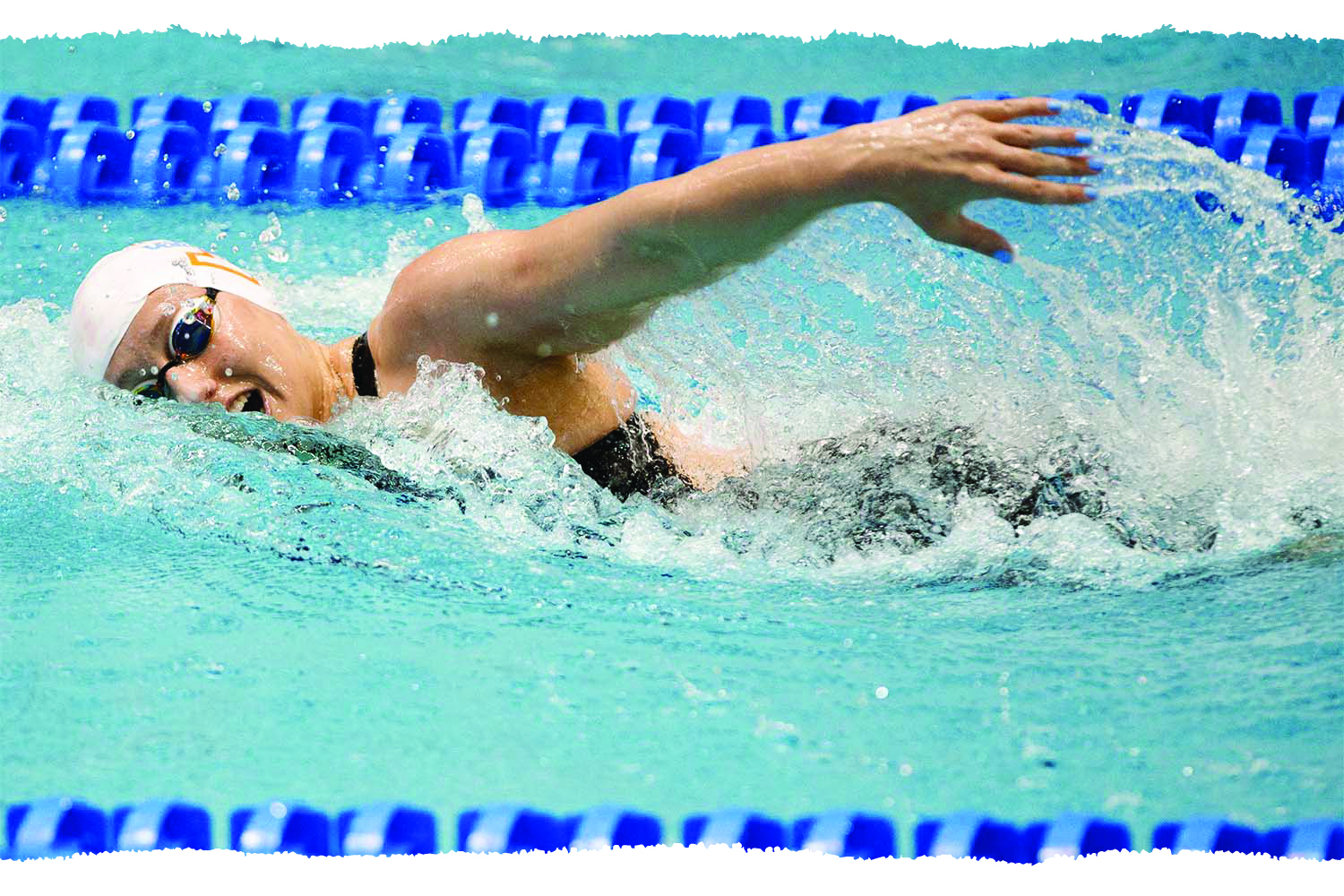
“It was so surreal. It was something that I’ve been dreaming of since I started swimming when I was 9. So, to have it finally all come together was nothing short of amazing,” Douthwright said. “Being with everybody in that environment, being a part of that, was something I’m so proud of and so grateful for that opportunity.”
Douthwright is a seven-time All-American for the Lady Vols. She’s an SEC champion in the 200 free and 400 medley free and was runner-up in the 200 free at the 2023 NCAA Championships.
Douthwright has done it all while balancing a challenging academic load as a pre-med student with a goal of attending medical school once she completes her engineering studies at UT.
“I think it’s pushed me. I’ve had to learn so many things, especially time management with swimming and everything,” Douthwright said. “But I really love studying biomedical engineering because I’ve always enjoyed physics, math, and biology. I’m getting more into the innovation part of it, which I really like.”
Pushing the Limits
Douthwright has always challenged herself to go beyond what many think is possible. In 2015 at age 12, she became the youngest person to ever swim the Northumberland Strait (a 15-kilometer span of open water between New Brunswick and Prince Edward Island).
When she was being recruited to UT, Douthwright saw an opportunity to expand her horizons and be surrounded by people who would maximize her potential in the pool and in the classroom.
“Coming from Canada, nobody had really gone through the recruiting process. I didn’t have anybody to talk to about it,” she said. “I spoke with a lot of schools, but the coaches at Tennessee just really stood out as people that cared about me as a person, more than just an athlete. I also meshed with the team culture, and just loved all of the ideas that they presented.”
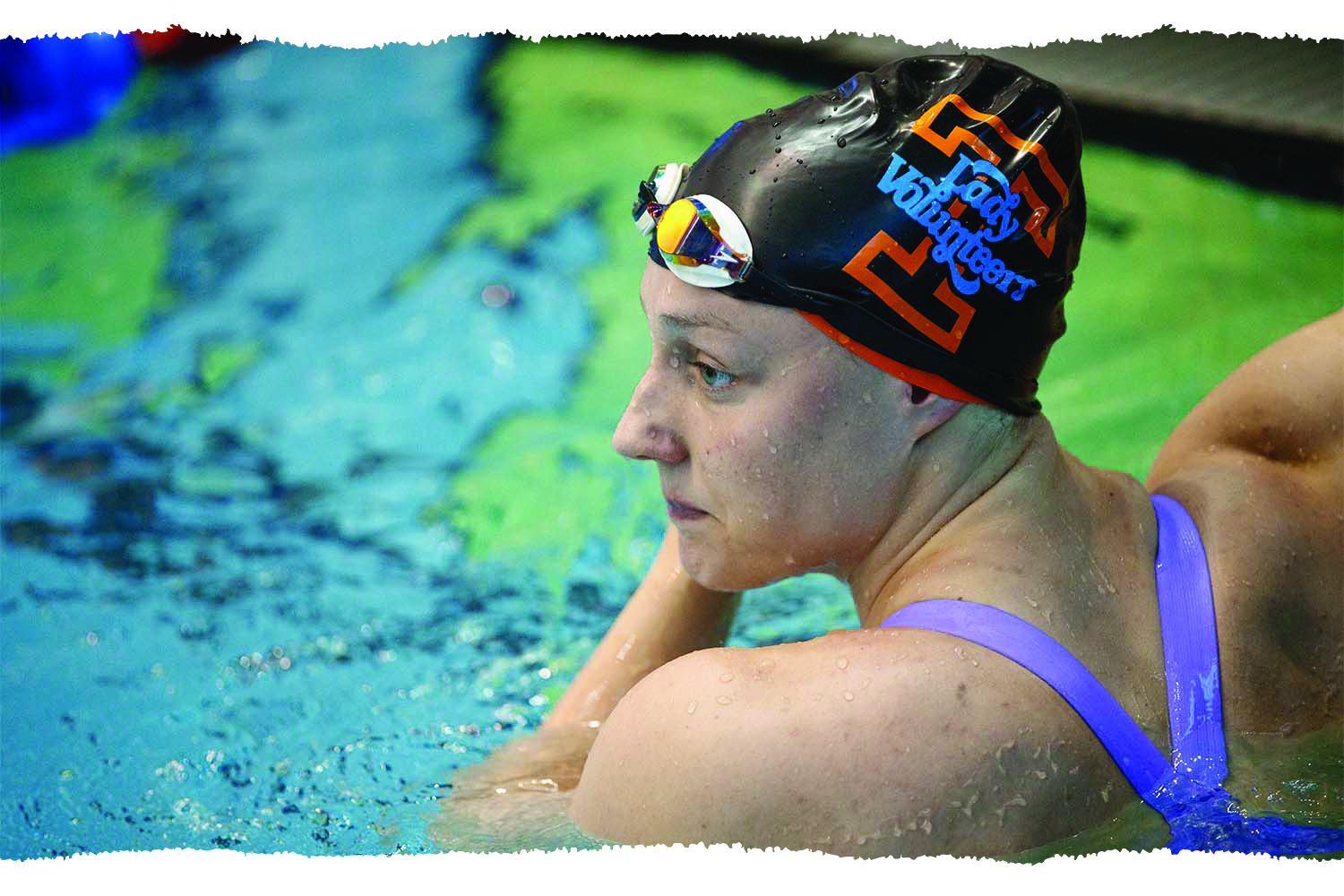
Although Douthwright hasn’t been able to pursue any research opportunities at UT because of her busy schedule, she has found other ways to supplement the hands-on experience.
“The professors have done a great job incorporating stuff into classes,” she said. “Like in my coding class, there was little robot that you work with a team to do. A bunch of the team projects have started me on that road of thinking in that way and trying to apply some of the things we’re learning.”
Douthwright plans to remain an engineering student at UT for five years while training for the 2028 Olympics in Los Angeles. After she arrived back from Paris, she had the Olympic rings tattooed on her arm to commemorate her debut in the Games. Her classmates have taken notice, even if they may not have realized the significance.
“Some people just think that I’m a huge fan and just love the Olympics. It has started some interesting conversations,” she said with a laugh. “But the tattoo definitely helps people kind of recognize that I swam in Paris.”